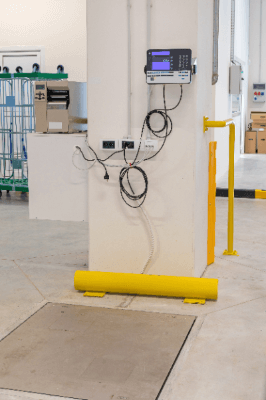What Are Floor Scales?
 Floor scales are weighing devices installed on the floor for accurately measuring the weight of heavy objects or cargo.
Floor scales are weighing devices installed on the floor for accurately measuring the weight of heavy objects or cargo.
There are two main types: above-ground, which can be moved and installed as needed, and pit-mounted, with a platform flush against the ground. Platform dimensions typically range from about 1 to 2 meters square, with maximum weight capacities from less than 1 ton to over 10 tons.
Models may feature low-floor designs for easy loading, height-adjustable options, waterproof and dustproof structures for harsh environments, and non-slip finishes for safe loading.
Applications of Floor Scales
These scales are utilized in logistics warehouses, agricultural markets, chemical plants, and food factories for weighing operations. They are used to weigh pallets loaded with goods in warehouses and, in factories, to weigh tanks and wagons containing raw materials and products. The process involves connecting an indicator to the platform, placing the item on it, and reading the weight digitally displayed on the indicator.
Principles of Floor Scales
Weight measurement is conducted through built-in load cells, which are sensors converting force into electrical signals. Strain gage load cells, known for their accuracy, quick measurement, and longevity, are commonly used. They consist of a strain generator and a strain gage; when an external force is applied, the resulting strain changes the electrical resistance, which is then converted into a voltage signal for weight display.
Choosing a Floor Scale
- Weight Range and Accuracy: Ascertain the required weight range and select a scale that offers accurate measurements within that range, prioritizing precision for exact measurement needs.
- Durability and Load Capacity: Opt for a durable model with adequate load capacity to ensure it can withstand the weight of objects to be measured without damage.
- Design and Size: Consider the installation location and work environment when selecting the scale’s dimensions and design to ensure a good fit and appropriate appearance.
- Functions and Accessories: Evaluate the need for additional features such as data recording, touch screen displays, printing functions, and select accordingly.
- Manufacturer Reliability: Choose a scale from a reputable manufacturer with reliable after-sales service and warranty options, considering the potential costs of regular maintenance services.